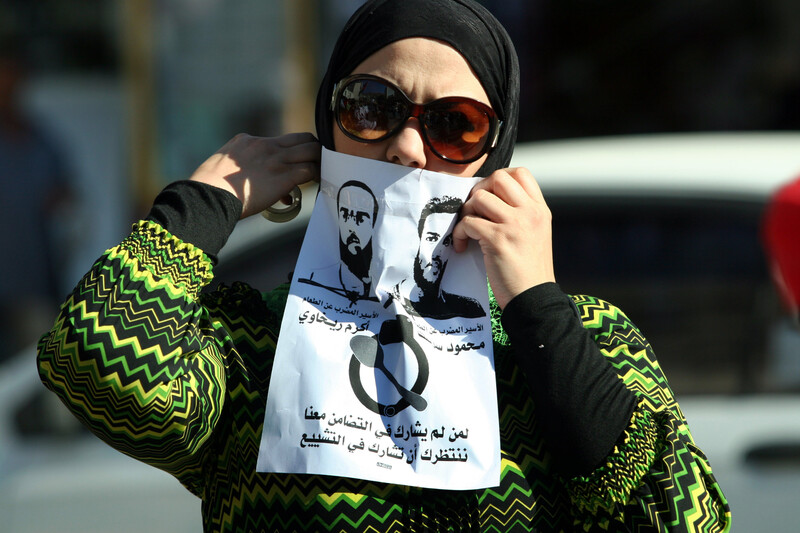Rights and Accountability 20 June 2012

A Palestinian woman holds pictures of hunger strikers Mahmoud Sarsak and Akram Rikhawi during a demonstration in their support in the West Bank city of Nablus on 3 June 2012
APA imagesPalestinian prisoner Akram Rikhawi is gravely ill after 70 days of his ongoing hunger strike. Today, Addameer and Physicians for Human Rights-Israel (PHR-Israel) warned in a joint statement that his life remains at imminent risk.
Calling for continued international solidarity actions, the groups demanded that Israel move him to a civilian hospital, end its policy of restricting visits by independent doctors, and lift its ban on family visits to hunger striking prisoners.
They also expressed concern for Samer Al-Barq, who is on his 31st day of renewed hunger strike today to protest his administrative detention without charge or trial.
The statement noted:
Addameer lawyer Mona Neddaf was able to visit [Rikhawi] yesterday in Ramleh prison medical clinic, though independent doctors from PHR-Israel are still being denied regular access to him since last visiting on 6 June.
Ms. Neddaf noted following her visit that Akram is extremely tired and weak and now weighs only 49 kilos. Furthermore, since 16 June he is refusing any vitamins and fluids through an IV. Though he is sustaining himself on water alone, Ms. Neddaf was troubled to observe that even drinking water is now very difficult for him and he is only able to consume approximately one liter per day.
Rikhawi, who suffers from chronic diabetes and asthma, was arrested in 2004 and sentenced to 9 years imprisonment by Israeli military courts. According to an earlier Addameer release:
Akram launched his hunger strike on 12 April, demanding that his medical condition be considered during the discussion of his request for an earlier release. Every prisoner is entitled to ask to be considered for an earlier release when he has served at least two thirds of his sentence.
Today, Addameer and PHR-Israel urged continued action on behalf of still hunger striking Palestinian prisoners:
Surely the increased action from individuals and institutions all over the world on behalf of Mahmoud Sarsak contributed to Israeli authorities’ acceptance of his demands, and it is therefore clear that urgent pressure is needed on behalf of Akram Rikhawi and Samer Al-Barq as well, before it is too late.
On Monday, Palestinian national footballer player Mahmoud Sarsak ended a three-month hunger strike that brought him to the edge of death, after Israel acceeded to his demands to free him on 10 July.
Dutch public figures play football for Palestinian prisoners
In a sign of the growing international support for the Palestinian prisoners’ struggle, a video released today features prominent Dutch public figures and children playing football.
“In the video, people are seen wearing an orange t-shirt in the style of the Dutch national soccer team, with the number 90 – referring to the period of the hunger strike – and Mahmoud Al Sarsak’s name written on the back of it,” text accompanying the video explains.
From the press release accompanying the video:Dutch politicians and other prominent citizens have participated in a video protesting against the ongoing Israeli practice of administrative detention of Palestinian civilians. In this short film by Dutch filmmaker Abdelkarim El-Fassi, former prime minister Dries van Agt and members of Dutch Parliament Harry van Bommel of the Socialist Party and Tofik Dibi of the Green Left, have expressed their dismay over this issue. They voiced serious concerns about the treatment of Mahmoud Al Sarsak, who recently became the longest hunger striker in history by refusing food for 93 days. He forced a deal on June 18th for his release from Israeli prison on July 10th, in exchange for ending his hunger strike.




